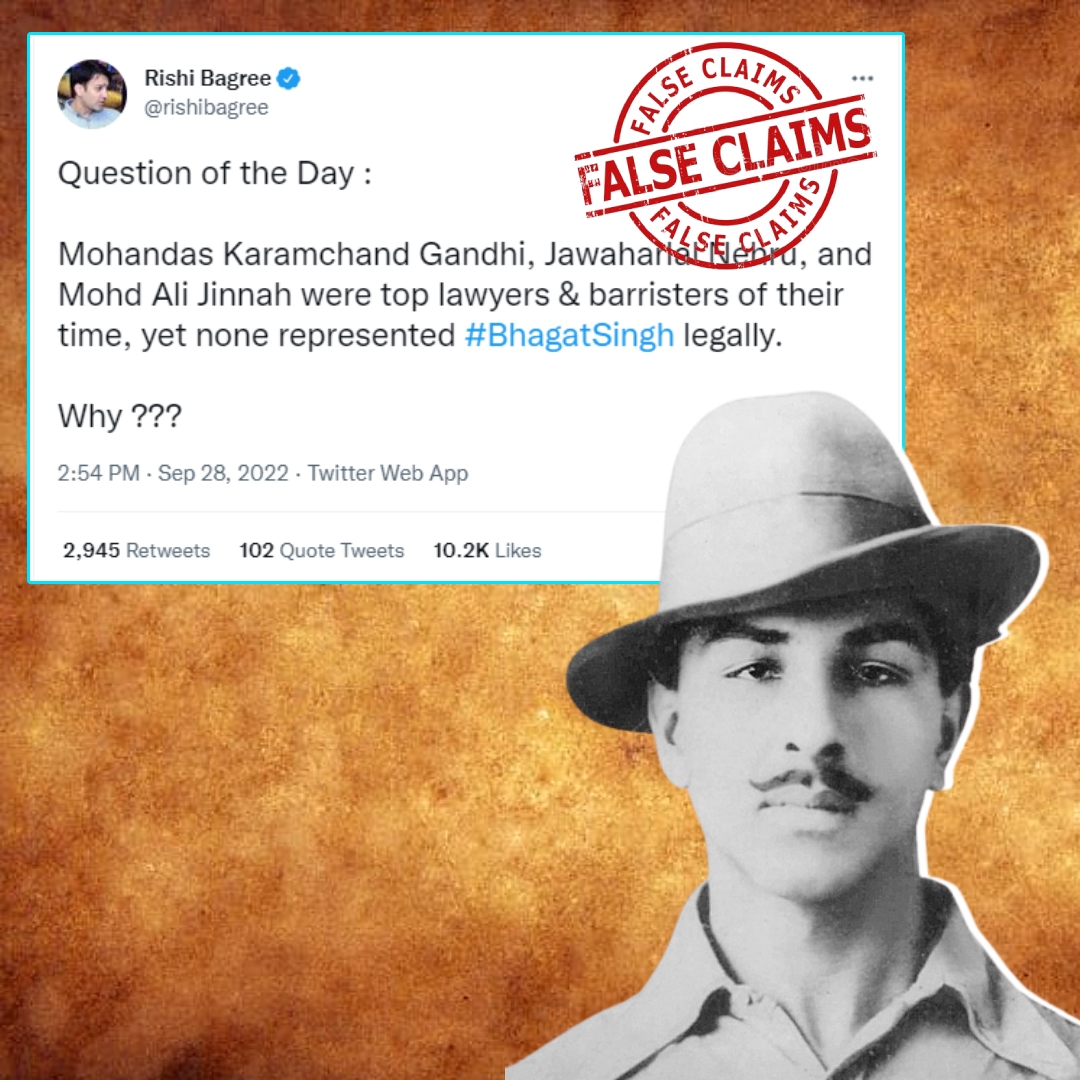
Image Credit: Twitter, Wikipedia/Bhagat Singh
Fact Check: Gandhi And Nehru Refused To Represent Bhagat Singh In Court? No, Viral Claim Is False!
India, 6 Oct 2022 9:36 AM GMT
Editor : Bharat Nayak |
As the founding editor, Bharat had been heading the newsroom during the formation years of the organization and worked towards editorial policies, conceptualizing and designing campaign strategies and collaborations. He believes that through the use of digital media, one could engage the millennial's in rational conversations about pertinent social issues, provoking them to think and bring a behavioral change accordingly.
Creatives : Jakir Hassan
A journalist at heart loves the in-depth work of reporting, writing, editing, research, and data analysis. A digital and social media enthusiast.
Rishi Bagree, a BJP supporter, tweeted, "Mohandas Karamchand Gandhi, Jawaharlal Nehru, and Mohd Ali Jinnah were top lawyers & barristers of their time, yet none represented #BhagatSingh legally. Why???". The Logical Indian Fact-Check team found that Bhagat Singh had declined to be represented by a lawyer.
A viral message on social media claims that Bhagat Singh was not represented during his court trials by the top lawyers of his time. The social media posts implicate historical leaders such as Mahatma Gandhi, Jawaharlal Nehru, and Muhammad Ali Jinnah, claiming that they refused to represent Bhagat Singh.
Claim:
Rishi Bagree tweeted the following claim, "Mohandas Karamchand Gandhi, Jawaharlal Nehru, and Mohd Ali Jinnah were top lawyers & barristers of their time, yet none represented #BhagatSingh legally. Why?"
This claim was amplified by Twitter users in several tweets, as can be seen here.
The post is also viral across Facebook.
Fact Check:
The Logical Indian fact-check team verified the claim and found it to be false. We found that Bhagat Singh had declined to be represented by a lawyer.
Bhagat Singh faced two court trials, the 1929 Central Assembly bombing case and the Lahore conspiracy case of 1928. We conducted a keyword search with the keywords 'Bhagat Singh lawyer'.
We came across a The Hindu article published on August 15, 2011. The Hindu report mentions that Bhagat Singh faced two trials. The Hindu article mentions that Bhagat Singh fought his own case with the help of a legal adviser.
The article mentions legal scholar A.G. Noorani's book 'The Trial of Bhagat Singh: Politics of Justice'. We conducted a keyword search and found a reference to a lawyer on page 33 of the book.
On April 8, 1929, Bhagat Singh and Batukeshwar Dutt threw political handouts and smoked bombs at the Delhi Central Legislative Assembly. The aim of the bombing was not to cause harm but protest against the passing of two repressive bills.
The case trial began in the District Jail on May 7, 1929, where Asaf Ali appeared for the defence, while Rai Bahadur Suraj Narain appeared for the prosecution. The book mentions that Bhagat Singh had informed his family that all was well and that there was "no need to engage a lawyer."
On Page 52 of the book, the author notes that Bhagat Singh declined representation by a lawyer.
We then checked other sources to verify whether Bhagat Singh had opted for a lawyer. We came across this document, 'Lahore Conspiracy Case, 1930 Proceedings' on the Indian Culture portal.
Page 13 of the document mentions that Singh had opted only for a legal adviser and not for a lawyer. The legal adviser neither cross-examined witnesses nor addressed the court.
We then conducted a keyword search to ascertain whether there was any interaction between Jawaharlal Nehru and Bhagat Singh. We came across an article by The Print published on 10 May 2018.
The Print article noted that after Bhagat Singh, Rajguru and Sukhdev had started an indefinite hunger strike in jail. Nehru paid them a visit in prison when their condition started deteriorating. Nehru described the visit in his autobiography, writing that he had visited Bhagat Singh, Batukeshwar Bhat and Jatindranath Das and all the other accused in the Lahore conspiracy case.
On Page 144, Nehru writes in his autobiography, "I happened to be in Lahore when the hunger strike was already a month old…I saw Bhagat Singh for the first time, Jatindranath Das and a few others. They were all fragile and bedridden, and it was hardly possible to talk to them much. Bhagat Singh had an attractive, intellectual face, remarkably calm and peaceful. There seemed to be no anger in it."
The Print article also mentions that Mahatma Gandhi attempted to seek reprieve for Bhagat Singh and the other accused in the Lahore conspiracy case.
Reportedly, on 19 March 1931, Gandhi met Lord Irwin, the former governor general and viceroy of British India, for a mercy plea. However, the plea was not considered and, four days later Bhagat Singh was hanged.
In a response, reportedly, Nehru passed a resolution in Congress where admiration for Bhagat Singh, Sukhdev and Rajguru was noted. "This Congress is of the opinion that this triple execution is an act of wanton vengeance and is a deliberate flouting of the unanimous demand of the nation for commutation," the resolution read.
In A.G Noorani's book, on Page 233, in the 'Gandhi's Truth' chapter, he provides more details about Gandhi's request to Lord Irwin for Bhagat Singh's execution to be suspended.
"The murders were gruesome. The bombs in the Assembly Chamber aroused indignation in many nationalists. Gandhi found both actions revolting. He studiously and conspicuously refrained from visiting Bhagat Singh and hts associates in prison," the book notes.
In the same book, Mohammed Ali Jinnah's defense of Bhagat Singh is recorded in the meeting of the Central Assembly on September 12, 1929.
"The man who goes on hunger-strike has a soul. He is moved by that soul and he believes in the justice of his cause, he is not an ordinary criminal who is guilty of cold-blooded, sordid, wicked crime," Jinnah is quoted as saying.
Jinnah says that he disapproves of the actions of Bhagat Singh. "You cannot prevent such crimes being committed, however much you deplore them and however much you may say that they are misguided. It is the system, this damnable system of Government, which is resented by the people," Jinnah is quoted as saying.
Conclusion:
In our Fact Check, we found that Bhagat Singh had declined to be represented by a lawyer. He did have a legal adviser but the adviser wasn't permitted to cross-examine witnesses or address the court. Gandhi, Nehru and Jinnah were all aware and sympathetic to Bhagat Singh's plight even though they weren't supportive of his actions. They had strongly appealed for Singh to be pardoned, however the British government did not relent.
Thus, we can ascertain that since Bhagat Singh fought his own cases without a lawyer, the leaders and barristers of the time are not complicit in not helping him with his trials.
If you have any news that you believe needs to be fact-checked, please email us at factcheck@thelogicalindian.com or WhatsApp at 6364000343.
Also Read: Did People Wave Pakistan's Flag During Bharat Jodo Yatra? Know The Viral Truth Here!
 All section
All section














